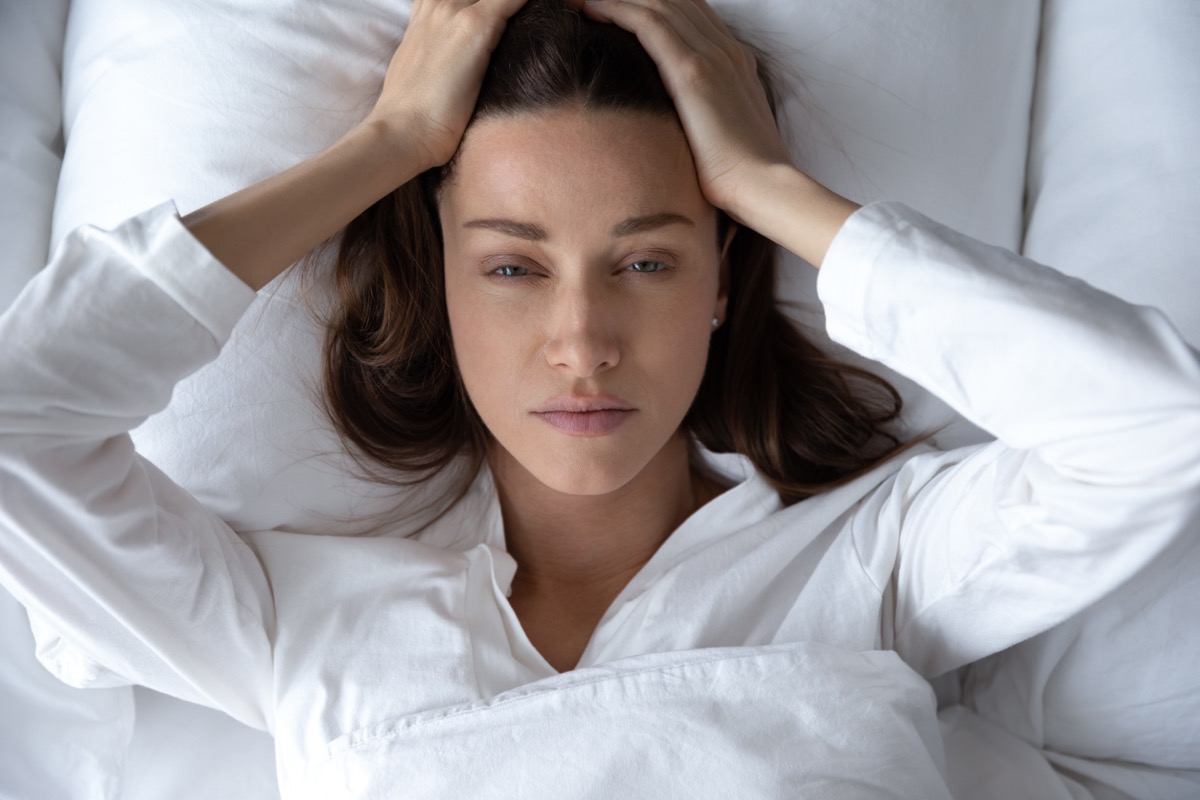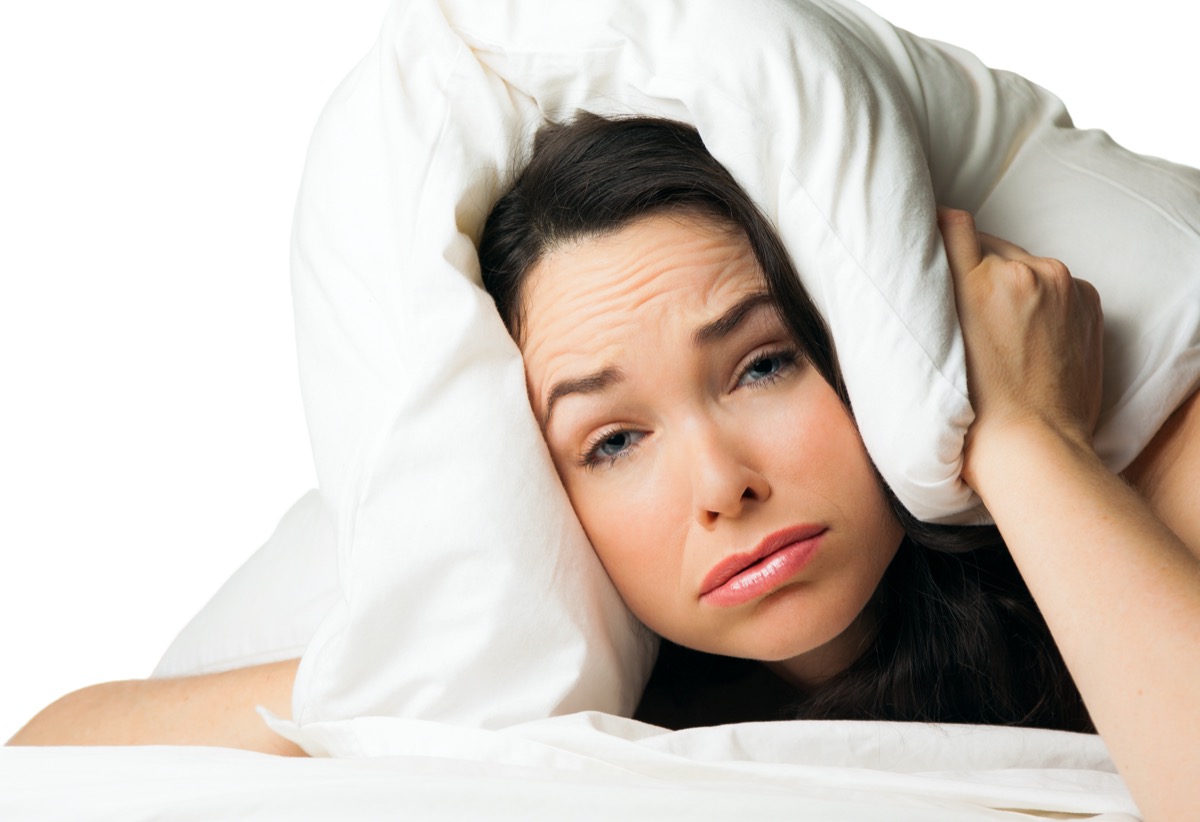Secret Tricks for Falling Asleep When You Can't Fall Asleep, Say Experts

If you're not afraid of a little doomscrolling, chances are you've seen the news all pandemic long: The era of COVID-19 has decimated America's sleep—and for the last 15 months we've been living in a state of collective "coronasomnia".
While there's certainly no denying that a global viral pandemic has made it harder for countless of us to get meaningful shuteye, the truth is, we've been having sleep problems for quite a while now. In fact, one study published in Sleep Health just a few months before the emergence of COVID-19 found that more and more Americans were struggling to fall and stay asleep, year over year, between 2013 and 2017.
Just like breathing or using the bathroom, sleep is a non-negotiable part of life, but unlike other bodily functions, sleep doesn't happen quite as automatically. Even if everyone has their own personal strategies for how to fall asleep during a particularly restless night, all too often they simply fail to get the job done. If your usual insomnia fixes haven't been working lately, and you regularly find yourself counting sheep to no avail, read on to learn about some secret tricks for falling asleep when you can't fall asleep. And for more amazing sleep advice, make sure you know why It's Worse for You to Sleep on This Side of Your Body, Says Science.
Put Your Thoughts on a Balloon and Let Them Drift Away

Believe it or not, the human mind is hardwired to think and produce new thoughts 24/7. Even as we're consciously asleep, our minds are hard at work processing the day's events and finding room for new memories. That's all well and good once we've crossed over into dreamland, but everyone has found themselves anxiously up all night over one or two intrusive thoughts or worries that just won't stop repeating on a loop.
If this variety of insomnia sounds familiar, Robert Stickgold, MD, professor of psychiatry at Harvard Medical School has a suggestion. Don't attempt to block out the thought that's keeping you up. Instead, acknowledge it for a moment or two before allowing it to slip away. This approach is similar to meditation. There's no way to totally quiet the mind, so meditating people are often encouraged to simply acknowledge new thoughts without judgment, before re-focusing on their breath.
This technique's efficacy may also be increased by adding some mental imagery. "There are a number of imagery devices that can work: having a ticker tape or balloon shuttle it away, or putting it on a tee and knocking it down the fairway. The main thing is to realize that the mere existence of the thought is not a problem," writes Steve Calechman for Harvard Health Publishing. And for more on sleep, don't miss Why Listening to Taylor Swift Before Bed Will Ruin Your Sleep!
Try to Stay Awake (Seriously!)

This one may sound crazy, but purposely attempting to stay awake as long as possible has been a cognitive-behavioral treatment for insomnia for decades. Technically termed paradoxical intention, this strategy is all about taking a laid-back approach to sleep issues. Convince yourself that you truly don't care if you end up falling asleep, and chances are before you know it you'll have drifted off without even realizing it.
Research published in the scientific journal Behavioural and Cognitive Psychotherapy reports paradoxical intention helped a group of individuals struggling with insomnia reduce nighttime anxiety, sleep effort, and the perceived time it took to fall asleep.
"Telling yourself before bed, 'I'm going to lay here awake and I'm fine with that,' will help relax an overly anxious brain and will paradoxically make it easier to fall asleep." says Sujay Kansagra, MD, the director of Duke University's Pediatric Neurology Sleep Medicine Program. And for more on sleep, make sure you know What Your Weird Dreams Really Mean, According to a New Study.
Make Your To-Do List

Just can't seem to unwind at bedtime? Consider adding a nightly to-do list for the next day to your evening routine. A study published in the Journal of Experimental Social Psychology found that writing a to-do list for just five minutes before bed helped a group of volunteers fall asleep significantly faster than others instructed to compile a list of tasks they had accomplished over the course of that day. Notably, the more specific a person's to-do list was for the next day, the faster they fell asleep! So don't skimp on the details.
"We live in a 24/7 culture in which our to-do lists seem to be constantly growing and causing us to worry about unfinished tasks at bedtime," says lead study author Michael K. Scullin, Ph.D., director of Baylor's Sleep Neuroscience and Cognition Laboratory and assistant professor of psychology and neuroscience. "Most people just cycle through their to-do lists in their heads, and so we wanted to explore whether the act of writing them down could counteract nighttime difficulties with falling asleep."
Try the Military Method

If there's one field that absolutely demands alertness, it's the military. There's no time for insomnia in the life of a soldier, which is why the U.S. Navy Pre-Flight School developed an astoundingly effective trick to fall asleep within two minutes flat (even while sitting up!). First reported to us civilians by Sharon Ackman, this strategy usually takes pilots about six weeks of practice to perfect.
Per Healthline, here's how it goes: 1.) To start, relax your face and be sure to include the muscles inside your mouth. 2.) From there drop and release as much tension as possible as from your shoulders while lowering your hands to the side of your body. 3.) Exhale and relax your chest. 4.) Relax your lower body (legs, calves, thighs). 5.) Clear your mind by imagining a relaxing setting of your choosing for 10 seconds. 6.) If you're still feeling awake and alert at this point, repeat the phrase "don't think" in your mind for another 10 seconds.
Try TikTok's Favorite Trick

This supposed fall-asleep trick was touted as "life-changing" by one psychology graduate student in the United Kingdom who goes by the handle Psychologee. So far, the brief clip has been viewed well more than 3.7 million times, has 1.1 million likes, and has generated no shortage of chatter. "Omg thank you so much for this trick!," commented @aliciar. "It literally changed my sleeping game and I've tried everything!"
"My psychology proffessor [sic] told me this trick to fall asleep in 5 mins," instructs the TikTok user. "It cured my insomnia."
She elaborates: "Start listing things in your head but make sure they aren't directly related. E.g. Potatoes, tarzan [sic], seggs, Violin… The more random, the better."
We can't back this one with science, but it couldn't hurt to try!
But Whatever You Try, Don't Rely on Sleep Meds

The occasional sleeping pill can certainly help if you only experience insomnia every now and then, but relying on any drug for long-term sleep improvement is a mistake. Recent research published in BMJ Open reports that the long-term use of prescription sleep meds is not linked to any actual improvements in sleep quality. Even worse, sleep meds gradually lose their effectiveness the more they're taken and frequently cause rebound insomnia upon cessation. So consider yourself warned! And for more on sleep, don't miss The Secret Side Effect of Sleeping in Too Late, Says New Study.








